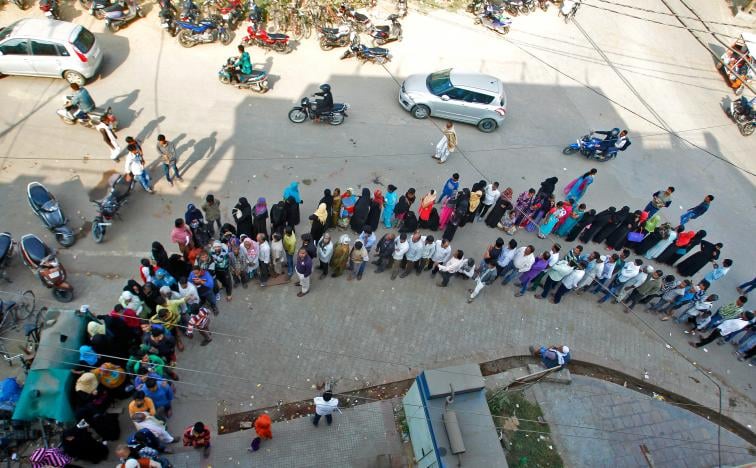
A surgical strike on corruption. Shock therapy for the economy. A financial system in chaos. All are descriptions of the recent actions taken by Narendra Modi, the Prime Minister of India to crack down on and root out corruption, money laundering, and the illicit financial transactions that comprise the so-called shadow economy.
India is one of the world’s most cash-dependent countries. Over 90% of consumer purchases are transacted in cash. Much of this ends up as “black money,” used for unofficial or illicit transactions. Corruption, including racketeering and counterfeiting, is extensive, plus few workers pay income taxes and many rely on informal payments.
Modi’s solution to this crippling problem? Ban his own country’s currency. On November 8, 2016, with no warning and to the shock of many at home and abroad, Modi declared India’s 2 most popular bank notes—500 and 1000 rupee bills—null and void. Instantly, cash held by millions of people became worthless paper (or demonetized, in finance terminology). The 500 and 1000 rupee notes represent 86% of cash in circulation, and according to Reuters “pushed Asia’s third largest economy to the brink of a liquidity crisis.”
As the government introduced new, theoretically “clean” (literally and figuratively) banknotes, what this meant for most Indians is that ATMs became inoperable. They were not reprogrammed to dispense the new notes prior to the announcement; the public was purposefully kept in the dark. The idea is that this would have tipped off users of black money, causing them to cover their tracks.
As a consequence, lines at banks stretched far and wide. As Panos Mourdoukoutas writes in Forbes, the currency shakeup “brought the nation’s economy to a standstill.” Natasha Sarin and Lawrence Summers of Harvard University wrote that the move is “is by far the most sweeping change in currency policy that has occurred anywhere in the world in decades.”

Customers wait in a long line outside a bank in Allahabad, India on Nov. 16, 2016. (Reuters/Jitendra Prakash)
Modi and his administration have steadfastly supported the drastic policy. The government believes it will expose corruption, people with unaccounted for or undeclared wealth, and counterfeiting operations with a goal of eliminating black money.
Modi is even counting on the problems caused by the demonetization becoming the solution. The theory is that the broken ATMs and long bank lines making it difficult to acquire new, legally recognized cash will spur people to adopt digital payment methods, thereby boosting India’s nascent e-commerce sector. On November 27 in a national radio address, Modi urged small business owners to embrace digital transaction systems such as mobile bank applications and credit card swipe readers.
In an attempt to convince tax evaders to join the formal economy, on November 28 Indian Finance Minister Arun Jaitley pledged an amnesty scheme for anyone who legitimately declares their holdings. The move could lead to the recognition of billions of dollars of previously undeclared income.
While the action was certainly shocking, also surprising is that many Indians have seemed to support it. According to James Crabtree in Foreign Policy, “Modi trusted his instincts that both the boldness of the move, and perhaps even the pain it introduced, would win him support. Here he has been proved right […]. If that public sentiment holds, Modi’s gutsy (and arguably reckless) move will secure a remarkable political victory.”
But as popular as the measure may seem, critics are plentiful. The opposition Congress party has claimed Modi is fleecing the people of their hard-earned cash. Many economists question whether the shadow economy will be impacted by demonetization in any significant way. In fact, some are convinced the people who will be hurt the most are the very people the measure intended to help the most: average law-abiding citizens. And the people supposed to be bankrupted—criminals and cheats—will be no worse for the wear.
As Pranjul Bhandari, economist at HSBC in Mumbai, puts it, “The minor entrepreneur, the shopkeeper, the farmer will be hurt by this. And even among the bad guys, the risk is you catch the minnows, but the big fish escape.” This is certainly a troubling proposition. If it comes true, it would certainly erode any goodwill Modi has accumulated with this bold change.
Rooting out and eliminating corruption, collecting taxes, legitimizing the economy, reducing cash dependency and developing e-commerce are all fantastic goals. But will Modi’s decision to invalidate currency and replace it with new cash actually accomplish those goals? At this point the only reasonable answer is decidedly who knows? It seems hard to believe most (some? any?) of India’s financial problems will be solved by it.
It has certainly garnered worldwide attention to the country’s economic plight, and maybe this is the best outcome Modi could have hoped for. But many Indians are suffering because of it, including those whose lives were supposed to be improved by it. This situation needs to be rectified as soon possible. And now the world is watching.